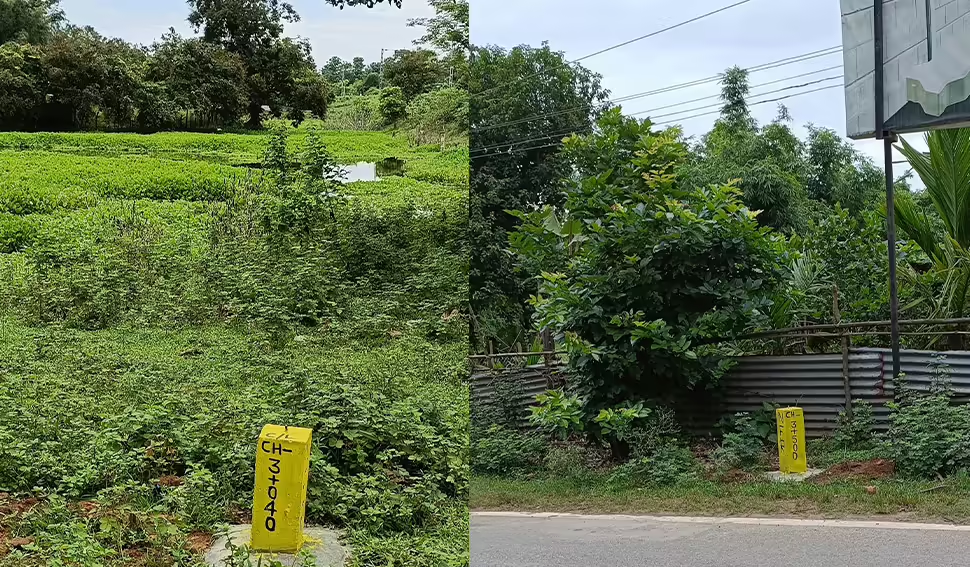Azara-Tetelia BG line project: 1,000 indigenous families facing displacement, loss of livelihood

The construction of a broad gauge railway line from 58 km Azara to Tetelia (Sonapur) through the Mikir Para Charkardo Village on the outskirts of Guwahati has raised significant concerns about the potential displacement and loss of livelihood for more than 1,000 indigenous families. This area is environmentally sensitive as it falls within the periphery of the Deepor Beel Wildlife Sanctuary, a Ramsar site, and the Rani Garbhanga Reserved Forest.
The Deepor Beel Wildlife Sanctuary is a crucial habitat for a variety of flora and fauna, including several endangered species. The proposed railway line could disrupt the ecological balance of the sanctuary, threaten wildlife, and lead to the destruction of forest areas that are vital to the indigenous communities living there.
According to Henry D. Teron, president of the Deepor Beel Suraksha Samaity, over 500 families lost their land due to government acquisition for the double line project in 2023 alone. “The railway authorities have proposed three alternative routes for the railway line, but if the project proceeds as planned, it could lead to the displacement of more than 1,000 families. This displacement would not only result in the loss of their land but also threaten their livelihoods,” Teron said.
Teron further emphasized the potential impact of the railway project, stating that five villages—Mikirpara Chakardo, Matia, Kalitapara, Deo Sutal, Maghuapara, and parts of Pamohi—will be significantly affected if the railway line passes through these areas.
Nripen Ingti, general secretary of the Assam Hill Tribal Council (AHTC), expressed deep concern over the repeated land acquisitions by railway authorities in the past. He pointed out that land has already been taken from the villagers twice for previous railway projects.
Ingti warned that if this indigenous tribal community is forced to give up their land once more for the current railway project, they will be rendered landless and displaced.
In a memorandum submitted to the NF Railway (Construction) general manager, seven local organizations—Deepor Beel Suraksha Samiti, Mikirpara Chakardo Raij Goyors, Mikirpara Chakardo Deepor Beel Suraksha Samiti, All Assam Tribal Sangha, Assam Hill Tribal Council, Navajyoti Sangha, and Deepor Beel Unnayan Samiti—raised serious concerns about the proposed railway project.
The organizations alleged that the survey for the project was initiated without any prior public hearing or consultation with the local residents.
The villagers have voiced strong concerns about the potential negative impact of the railway project on the biodiversity of the Deepor Beel Wildlife Sanctuary and the Rani Garbhanga Reserved Forest.\
Pramod Kalita, the general secretary of Deepor Beel Suraksha Samiti, expressed concern over the expansion of the railway line, stating that it is viewed as a significant threat to the biodiversity of Deepor Beel Wildlife Sanctuary and the Rani Garbhanga Reserved Forest.
Kalita highlighted the potential risks the project poses to these ecologically sensitive areas, which are home to a diverse range of species, including Asian elephants.
“The survey for the proposed railway project contradicts the recommendations of the Wildlife Institute of Dehradun. The institute had suggested realigning the existing railway track to minimize the impact on wildlife corridors. This recommendation was made to protect the ecological integrity of the area, particularly to ensure that the movement of wildlife within these corridors is not disrupted,” kalita also said.
Kalita pointed out that the proposed railway line would disrupt crucial elephant corridors, which are vital for the safe movement of elephants and other wildlife in the area.
The organizations urged the railway authorities to reconsider its plan and explore alternative routes for the railway project that would minimize the impact on both the environment and the local residents. By proposing alternative routes, they aim to protect the biodiversity of the Deepor Beel Wildlife Sanctuary and the Rani Garbhanga Reserved Forest while also safeguarding the livelihoods and homes of the indigenous communities in the area. The call reflects a strong desire for a balanced approach that prioritizes ecological conservation and the well-being of local populations.
“We also urge NF Railway authorities to conduct a thorough public hearing and address the concerns of the local communities before proceeding with the railway project,” Kalita added.
When contacted, a spokesperson for NF Railway stated, “The project is still in its early phases, with the survey process currently underway. There is still some time before any construction begins, potentially allowing for further discussions and considerations of the concerns raised by the local communities and environmental organizations.”

Leave a Reply